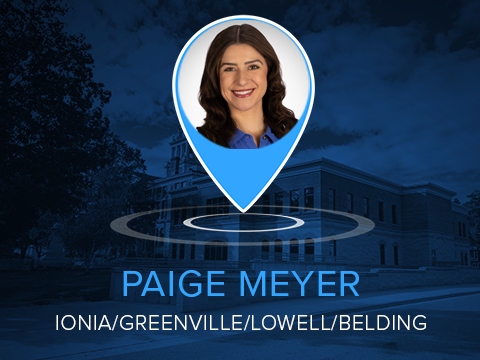KENT COUNTY, Mich. — Emily Aldrich has a new baby boy to celebrate with this holiday season, but the greatest gift is knowing she has protected him from contracting certain types of cancer.
Aldrich's journey to become a mom was full of ups and downs after learning both her mother and aunt had been diagnosed with breast cancer. Doctors recommended that Aldrich and her siblings undergo genetic testing to find out if they carried the same cancer-causing gene.
"We were expecting it to be like one of the BRCA genes, and it came back as CDHI, which predisposes you to stomach and breast cancer," Aldrich explained. "Initially it felt kind of like a death sentence, where it was like, 'Oh my goodness, I have such a high percentage for cancer. This is probably going to be what takes me out.'"
Aldrich made the tough decision to put off having a family to undergo stomach surgery. "[Doctors] found that there was cancer already in my stomach, so I knew at that point that I had made the right decision."
"It was just something that I had to do," she said. "The entire stomach was removed, so basically they just take your esophagus and attach it to your intestines, so now my food doesn't go through a stomach, it doesn't sit in a pocket anymore, it just goes straight through to my intestines, I absorb basically everything that way as well."
After recovering, Aldrich was ready to start thinking again about having kids. It led to more tough decisions, as Aldrich and her husband grappled with the idea of in-vitro fertilization (IVF) and genetic testing on their future offspring.
"That took a lot of discussions with my husband and my family to know, is this the right choice for us?" said Aldrich. "There's a lot of questions that we had, but at the end of the day I did not want to pass this gene on to my kids."
Aldrich underwent two rounds of IVF at The Fertility Center in Grand Rapids to create several embryos. Through preimplantation genetic screening, they were able to determine which embryos were healthy and did not carry the gene. "That testing done on embryos is called PGT-M for a monogenetic disorder," explained Dr. Mili Thakur. "These embryos then undergo a process of embryo culture for five or six days. After that, we take some cells out from the embryo and do send it to be analyzed for that specific genetic condition."
"I think the most important role of PGT-M would be for individuals who have an inherited cancer," she continued. "So, either they already know that they have cancer and have that gene that is causing them, -- such as [BRCA1 or BRCA2] genes -- or if they have a family member who's affected and then they found out they are unaffected at this time but know now that they carry that genetic change. Another reason for it would be individuals affected by a complicated genetic condition. It's also helpful for multiple pregnancy losses. When one or the other partner carries chromosomal changes that could affect...success with a pregnancy."
Aldrich transferred her first healthy embryo in February, and baby Charlie was born early in October.
"He is a healthy little boy. He's growing like a little weed, and we just couldn't be happier," said Aldrich. "He will never have to have his stomach removed because of, at least, this kind of stomach cancer. We have a healthy little boy, and we know that he does not have this gene."
Aldrich said she has two embryos remaining that she hopes to use in the future.
"We're privileged to have this technique being available in the community for West Michigan and being able to serve families here, because it could be very burdensome for families with genetic conditions," said Dr. Thakur. "Now seeing that embryo [become] baby Charlie, it's exhilarating. It's very, very empowering. And it also feeds into our system to say that can we can help other families, just like [Emily's]."











